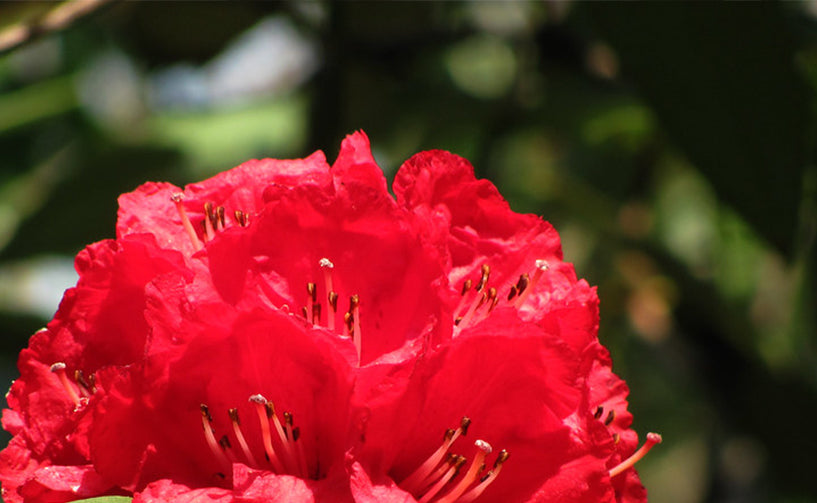Rhododendron, or Rhododendron arboreum, is an evergreen shrub or a small to medium-sized tree from the Ericaceae family, with bright red or pale pink flowers. The name ‘Rhododendron’ is derived from the Greek word – ‘rhodo’ which means ‘rose’ and ‘dendron’ which means ‘tree.’ And since this species is more like a tree, it is given the name ‘arboreum’ which means ‘tree-like’. Rhododendrons are distributed throughout the world but they are especially in abundance along the Himalayan regions of India –from Kashmir and Uttarkhand in the North to the hills of Nagaland and Manipur in the Eastern regions. In fact, this plant holds such significant importance to these regions that it is made the state tree in Uttarakhand and the state flower in Nagaland.
Also known by names like burans, buras, rohitaka, lali gurans, and so on, Rhododendrons are one such tree known for their many medicinal uses. Various parts of the plant, such as the leaves and flowers, have long been used in traditional medicine for the treatment of various ailments. However, it is the flower that has garnered the most attention among health enthusiasts even to this day, thanks to its incredible health-benefitting properties. The sweet nectar extracted from its bright red flowers is a common ingredient used, in these regions, to make sharbat or juice, which are commonly known as rhodojuice, which are known to be beneficial in the treatment of menstrual disorders. In addition to that, a decoction of the flowers is also used to treat nausea, loss of appetite, cough, and also for improving skin, liver and heart health.
Beyond its aesthetically appealing looks, Rhododendron’s flowers (and leaves) are a great source of antioxidants and other incredible phytochemicals that helps the body fight free radicals. Furthermore, it also contains rich anti-inflammatory properties that are beneficial in treating inflammation-related complications such as gout, arthritis, bronchitis, etc. Here are some other known benefits of the rhododendron plant.
Benefits of Rhododendron:
- Diabetes: Several studies have suggested that juice extract from the Rhododendron flower is beneficial in reducing high blood sugar and cholesterol levels. This is because the flower contains antioxidant properties, which may inhibit the action of some glucose enzymes.
- Anaemia and Body Weakness: Rhododendron flowers are also rich in iron which help treat anaemia. Apart from this, it also contains calcium, zinc, copper and other essential, which helps treat body weakness.
- Cough: The rich anti-inflammatory and antioxidant properties present in Rhododendron’s flower is known to help treat cough and other respiratory problems. Consuming tea made from Rhododendron flower has been used in traditional medicine to treat cough and cough disease.
- Skin Health: A juice made from the flower is known to help improve skin health and in preventing wrinkles and ageing. The juice also contains potent anti-inflammatory, anti-microbial and anti-bacterial properties which are beneficial in the treatment of rashes, acne, eczema and other skin inflammations.
- Liver Health: Potent antioxidants, such as flavonoids, saponins, and phenolic compounds, which are present in the Rhododendron leaves and flowers are beneficial for keeping the liver healthy. Rhodojuice is also known to help prevent the liver from damage.
- Heart Health: Rhododendron juice is a popular remedy among locals for reducing high blood pressure and lowering bad LDL cholesterol levels. Regular consumption of this juice can help enhance heart health naturally.
- Diarrhoea: Rhododendron’s flowers and leaves are also popular home remedies for treating diarrhoea, dysentery and other digestion issues. The flowers, in particular, has been proven to be extremely beneficial in treating dysentery.
- Body Irritation: Juice of Rhododendron’s flowers is an excellent solution for treating body irritation. The incredible medicinal properties content helps calm the body and reduce any burning sensation.
Due to its rich phytochemicals content, the consumption of Rhododendron, especially its flower, should be avoided in large quantities. Likewise, consumption of an extract or juice from its leaves should also be done with strict dosage as it may interfere with the action of some medications. Keep in mind that natural products are not always necessarily safe and dosages can be important. Be sure to follow relevant directions on product labels and consult with a physician or other healthcare professional for concerns.






